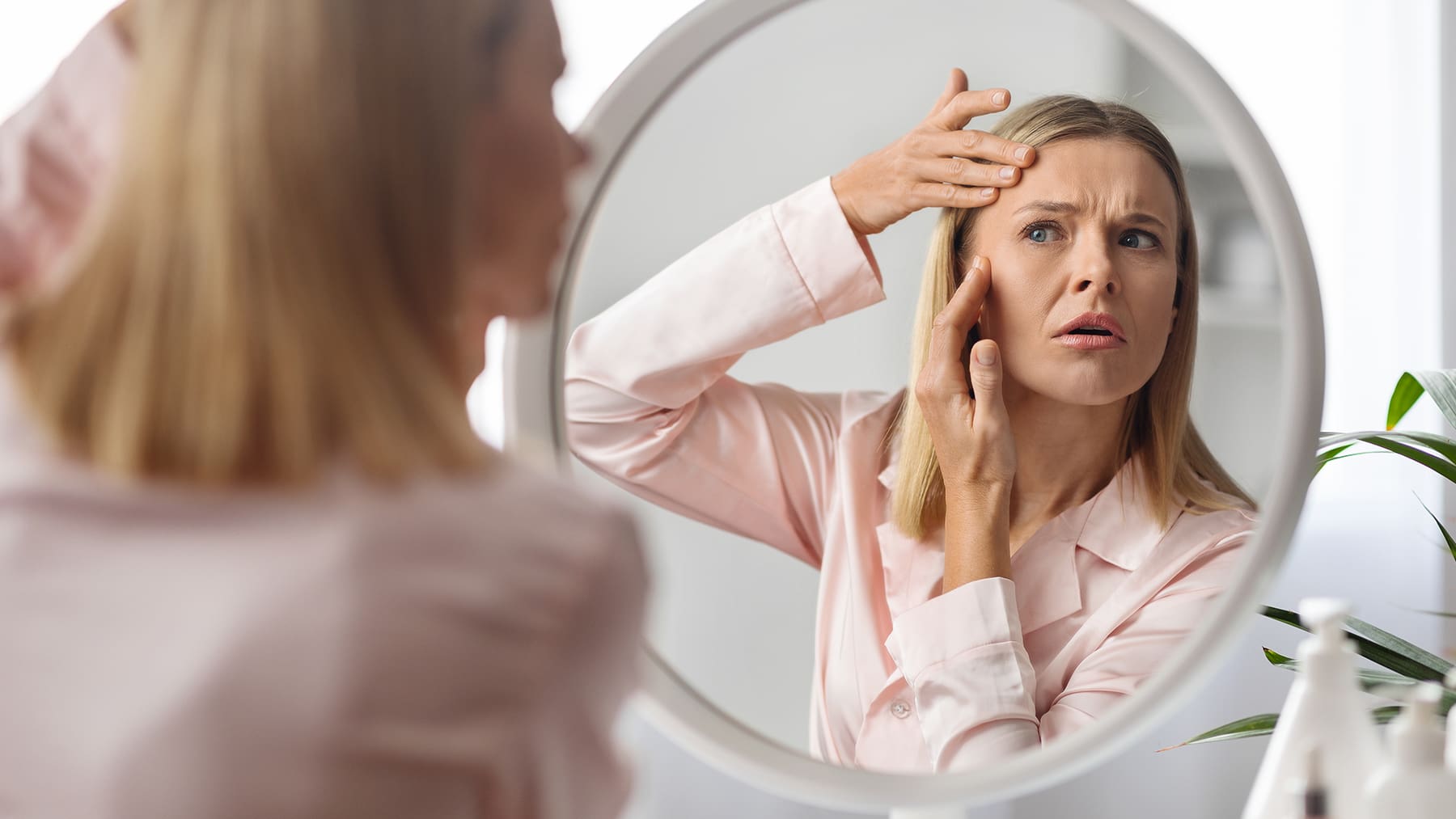Reviewed By Blake Gilliam, CRNP
Reading Time: 5 minutes
Estrogen is a powerful hormone that plays an important role in a woman’s body. It influences everything from your menstrual cycle and bone health to your mood and skin. Even though hot flashes are often associated with declining estrogen levels, there are many other, less common symptoms.
In this blog, we will explore some of the weird ways low estrogen can manifest and what you can do about it.
Table of Contents
Causes of Low Estrogen
Low estrogen levels can be triggered by various factors, each affecting your body differently. Here are some of them:
Menopause
Menopause is the most common cause of low levels of estrogen in women. As you age, your ovaries gradually produce less estrogen, leading to a natural decline in hormone levels. This transition typically begins in your late 40s or early 50s and is marked by the end of your menstrual cycle.
Ovarian Failure or Insufficiency
Sometimes, the ovaries stop functioning properly before the age of 40, a condition known as premature ovarian failure or primary ovarian insufficiency. This can happen due to genetic factors, autoimmune diseases, or damage from treatments like chemotherapy.
Autoimmune Diseases
Autoimmune diseases occur when the body’s immune system mistakenly attacks its own tissues, including the ovaries. Conditions like Hashimoto’s thyroiditis, lupus, or rheumatoid arthritis can interfere with estrogen production, leading to lower hormone levels. This disruption can cause irregular menstrual cycles and other symptoms associated with low estrogen.
Excessive Exercise
Excessive or intense physical activity can lead to a decrease in estrogen levels. This is especially true for athletes or those who engage in rigorous training routines without sufficient recovery time.
Pituitary Gland Disorders
The pituitary gland, located at the base of the brain, plays a critical role in regulating hormone production, including estrogen. Disorders or tumors affecting the pituitary gland can disrupt the production of hormones like follicle-stimulating hormone (FSH) and luteinizing hormone (LH), which are important for stimulating estrogen production in the ovaries.
Chronic Stress
Prolonged or chronic stress can have a profound impact on your hormone levels. When you’re stressed, your body produces high levels of cortisol, a stress hormone. Elevated cortisol levels can interfere with the production of estrogen, leading to a hormonal imbalance.
7 Weird Symptoms of Low Estrogen
1. Brain Fog and Cognitive Changes
You might find yourself struggling to recall simple facts, forgetting appointments, or feeling like your thoughts are moving through a haze. Cognitive tasks that once came easily can become frustratingly difficult. This mental cloudiness is often accompanied by memory lapses and difficulty concentrating, making even the simplest daily tasks seem overwhelming.
2. Brittle Hair and Hair Loss
You might notice more hair than usual in your comb or shower drain, and the overall volume of your hair may diminish. This change can be distressing, as it directly affects your appearance and self-esteem. The texture of your hair might also change, becoming drier and more fragile, making it harder to manage.
3. Skin Changes: Dryness and Wrinkles
When estrogen levels decline, your skin may lose its youthful plumpness and become dry, thin, and more susceptible to wrinkles. You might also experience itchy skin and notice that your skin doesn’t bounce back as it used to, which can make you feel as though you’re aging faster than expected.
4. Weight Changes: Unexplained Weight Gain
Despite maintaining a healthy diet and exercise routine, you might find yourself gaining weight, especially in areas where you’ve never struggled before. The shift in body fat distribution can affect how you feel about your body and your overall sense of well-being.
5. Discomfort and Pain: Back and Joint Pain
Estrogen has a protective effect on bones and joints, so when levels decline, you may start to feel aches and pains that weren’t there before. Joint pain, stiffness, and even back pain can become more pronounced.
These discomforts can make daily activities more challenging and might limit your mobility, impacting your quality of life. You may also notice that your joints feel more sensitive or that your back aches after periods of inactivity.
6. Mood Swings and Emotional Distress
Mood swings are a hallmark symptom of hormonal imbalance, and low estrogen can exacerbate emotional volatility. You might find yourself swinging from happiness to sadness or irritability with little provocation.
Anxiety and depression may also creep in, making it difficult to enjoy activities you once loved. This emotional rollercoaster can strain relationships and make you feel isolated or misunderstood.
7. Changes in Libido and Sexual Function
You may experience a diminished interest in sexual activity, and when you do engage, it might not be as pleasurable as before. Vaginal dryness and discomfort during intercourse are common, which can lead to a sense of detachment from your partner or a loss of intimacy.
Testing and Treatment Options
Hormone Testing Method
If you suspect that you have low estrogen, it’s important to undergo testing to confirm your hormone levels. We use saliva testing as a diagnostic tool for detecting hormone imbalances.
This method is straightforward and non-invasive, allowing us to accurately assess hormone levels at the tissue level, offering a more detailed understanding of your hormonal health.
Bioidentical Hormone Replacement Therapy (BHRT)
Bioidentical Hormone Replacement Therapy (BHRT) is a treatment designed to address low estrogen levels by using hormones identical to those naturally produced by your body. Hormone creams are a popular and effective option.
These creams are custom-formulated at compounding pharmacies to match your specific hormonal needs. The creams are applied directly to the skin, where the estrogen is absorbed into the bloodstream, allowing for a more controlled and steady release of the hormone.
Hormone Replacement Therapy in Madison, AL
If you’re experiencing any of the symptoms, consult with our experienced practitioner Blake Gilliam, CRNP. We’re dedicated to helping you achieve optimal health through personalized hormone therapy and comprehensive care.
If you are searching for ‘hormone replacement therapy in Madison, AL’ we can help! Call (256) 325-0955 to book an appointment or complete the online inquiry form.

